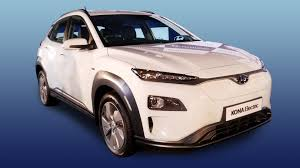Hyundai made history in India by launching the country’s first fully electric SUV, the Kona Electric, on 9 July 2019. This eco-friendly vehicle set new standards for electric mobility with its long-range capability and advanced driving modes.
- Impressive Driving Range:
The 39.2 kWh lithium-ion polymer battery offers a range of 452 km (as per ARAI testing) on a single charge.
Ideal for daily commutes as well as long drives.
- Powerful Performance:
Electric motor generates 136 PS (134 bhp) of power and 395 Nm of torque.
Can accelerate from 0 to 100 km/h in just 9.7 seconds.
- Fast Charging Capability:
DC fast charging can charge the battery up to 80% in just 57 minutes (using a 50 kW charger).
Standard AC charger (7.2 kW) takes around 6 hours 10 minutes for a full charge.
- Multiple Driving Modes:
Eco+ Mode – Maximizes efficiency for extended range.
Eco Mode – Balances power and economy.
Comfort Mode – Offers smooth, everyday driving.
Sport Mode – Delivers maximum power and acceleration for a thrilling drive.
- Regenerative Braking System:
Converts kinetic energy into electric power to recharge the battery while braking.
Adjustable three-level regenerative braking allows drivers to control energy recovery.
- Smart and Safe Features:
7-inch digital instrument cluster and 10.25-inch touchscreen infotainment system.
Hyundai BlueLink connected car technology for remote access.
6 airbags, ABS with EBD, electronic stability control (ESC), hill assist, and rear parking sensors/camera.
The first all-electric SUV in India, encouraging a shift towards sustainable mobility.
Boosted EV infrastructure development, including charging stations across India.
Strengthened Hyundai’s position as a pioneer in India’s electric vehicle revolution.
The Hyundai Kona Electric set the foundation for the growth of electric mobility in India, paving the way for future EV models and government incentives promoting sustainable transport.







